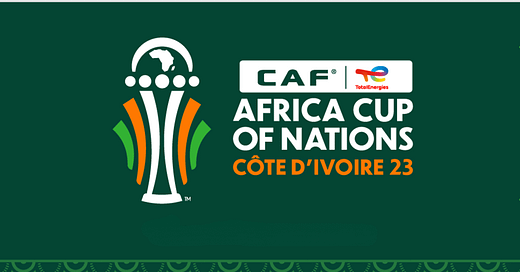For all the marbles
An unpredictable AFCON has pitched the Unspeakable against the Improbable for Africa's biggest prize
And then there were two: on Sunday night under the Abidjan night sky, host nation Ivory Coast will face off against Nigeria for the title of Africa’s premier footballing nation.
Perhaps this is, in fact, the most fitting conclusion to what has been a riveting Africa Cup of Nations (AFCON). While the quality on show has been as high as ever, this has been a tournament given over to storyline.
It is why AFCON 2023 has captured the popular imagination in a way that few previous editions managed. Strip away the condescension and subtly-veiled racism that has been the prevailing attitude toward the competition down the years and, at their core, human beings remain entranced by activity. If that activity is of the back-and-forth and/or zig-zag variety, all the better then to get the neurons firing.
This explains why a tournament this rich in terms of on-field expression would deem this final appropriate. In purely footballing terms, there have been more aesthetically pleasing watches than the Elephants and Super Eagles over the course of these past 25 days. However, these two sides have embodied different faces of the same coin: destiny, its pull inexorable like gravity, simultaneously maintaining their respective trajectories in orbit and keeping the rest of the field tethered to the ground.
For the purist, it is an evil under the sun: the likes of Senegal and Morocco, touted before the tournament, now doomed to, from the dirt, watch the lowly ride horseback. That the current iterations of Nigeria and Ivory Coast can be couched in such terms is, of course, relative and circumstantial: both nations boast about as much quality on paper as Africa’s top two sides, but have come through the fire despite hamstringing themselves in interesting, extensively documented ways.
That the Super Eagles have gone from an inability to beat Lesotho and Zimbabwe to this is remarkable enough in itself, but that sense of incredulity is further buttressed by coach Jose Peseiro’s decision-making and peculiar approach to squad management.
From handing a competitive debut to Stanley Nwabali in-tournament, to consciously limiting his own options through the tournament, to a physically exhausting style of play minted at the start of the competition, to his sometimes barely logical personnel alterations during matches, to subbing on three of his five penalty takers late in extra-time of the semi-final victory over South Africa. The 63-year-old has contrived to reach the cusp of success despite ignoring every shred of conventional wisdom to forge a path all his own.
For the former Porto and Sporting boss, it has been an exercise in winning over sceptics. Coming in, all the talk was of the lack of balance in Peseiro’s squads, with his team selections given over to a surfeit of attackers on any given matchday.
Come the tournament proper and he only went and pulled a 180, bringing in an extra defender and battening down the hatches. The result – the best defence, with only one open play goal conceded, in the entire tournament – speaks volumes, but arguably more impressive is the speed of the adoption and the depth of the buy-in. However one feels about the Portuguese coach, he has been able to convince the group, and that has spawned performances characterised by no little conviction and purpose.
The cost, however, has been a steep one, and so Nigeria return to Ebimpe, the cradle of their rebirth, in less than vigorous health. They will find, in Côte d’Ivoire, a reanimated foe roared on by a horde inside Stade Alassane Ouattara on Sunday.
The hosts, surely the first side to reach the final of a major tournament having lost two matches along the way, are proving Elephants to be just as long-lived as cats, and have played the knockout stage in an almost willfully forgetful state. To get this far, it was necessary to stow the Group Stage far in the recesses of the mind, starting afresh with a different coach and a renewed hope.
Gone is the disaster of Jean-Louis Gasset (no, this will and should not spark a trend of mid-tournament managerial retrenchment), the hammering at the hands of Equatorial Guinea, and the embarrassment of a swiftly rebuffed approach for Herve Renard. Emerse Fae, with no coaching reps whatsoever under his belt, has wisely leveraged the experience at his disposal, reintegrating the likes of Jean Michel Seri and Max Gradel. Out with the new, in with the old; after all, if lore surrounding the undead is to be believed, it makes sense that rank and strength come with advanced years.
The results have kept on coming, as apparently there is not an abundance of silver in the Ivory Coast. Franck Kessie’s pithy commentary following each implausible recovery has added to the cool factor, and only heightened the sense that something other – almost Faustian – is powering this pachyderm in its stomp through the AFCON landscape.
From eliminating the reigning champion despite falling behind inside five minutes, to scoring twice in added time against Mali despite a numerical disadvantage for 80 percent of the proceedings… Even the winner against DR Congo was the sort of freak goal only providence could manufacture: an off-balance, shinned effort into the ground and over the goalkeeper off a Hail Mary cross.
It sets the stage deliciously, two great forces crashing into one another: grit against fate, perspiration against inspiration. One must bow before the other, and while the weight of effort has seemed to hang heavy on Nigerian legs as the tournament has worn on, it would be just like this edition to pull one more cruel twist, and expose barely scabbed-over wounds for the host nation.
Chaos Digest now has a dedicated profile on X/Twitter. Please follow!




Poetic. Every metaphor has life in it, and asides Ivory Coast success is almost inexplicable, reeling with the mammoth difficulties encountered.
Let's gooooo Super Eagles!